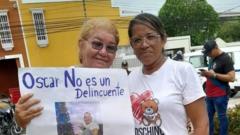The story of Gertrudis Pineda and her son Oscar highlights the distressing situation of 238 Venezuelans deported by the US to El Salvador’s notorious Cecot prison, with claims of wrongful detention and violations of both international and local legal frameworks. Activists and critics challenge the policies that led to their deportation, citing unconstitutional practices and the erosion of human rights in the region.
Venezuelan Deportees Face Dire Conditions in El Salvador’s Mega-Prison

Venezuelan Deportees Face Dire Conditions in El Salvador’s Mega-Prison
A mother’s agony reveals the plight of 238 Venezuelans deported to a maximum-security facility in El Salvador, raising significant human rights concerns and legal complexities.
In a tragic turn of events, a mother from Venezuela, Gertrudis Pineda, has been plunged into despair over the deportation of her son, Oscar, to the notorious Cecot prison in El Salvador. Oscar is among 238 Venezuelan nationals sent to this maximum-security facility, designed primarily to contain known gang members, in a move that has sparked outrage and severe allegations regarding human rights violations.
Gertrudis expresses her heartbreak, revealing that her son, who worked in the US saving money for their family, is now embroiled in a dire situation merely for pursuing better opportunities. “My son only went to seek the American Dream and now he's trapped in a nightmare,” she laments. The extent of her suffering is heightened by her lack of information about Oscar’s wellbeing, as the communication reached them only after they learned from a television broadcast that Oscar was in El Salvador, not Venezuela as they had presumed.
The U.S. government has accused these deportees of being affiliated with the Tren de Aragua gang, though advocates highlight that many were living law-abiding lives in the U.S. before their deportation under the Alien Enemies Act. The legal debate intensifies, with El Salvadoran immigration experts claiming that these deportations are unconstitutional as many detainees have no criminal records, not only in El Salvador but also in the countries where they previously resided.
Jaime Ortega, a lawyer advocating for the release of the deportees, notes that they are held in conditions akin to slavery without adequate legal documentation or support, emphasizing the dubious nature of their transfer to Cecot. El Salvador’s government, led by President Nayib Bukele, staunchly defends the move, citing it as part of a broader crackdown on gang violence while disregarding the validity of the individuals’ detentions.
Despite the government's claims of seeing a reduction in crime rates and a semblance of improved safety calculations in once gang-infested areas, there lurks a heavy toll on civil rights. Many citizens, such as Roxana, a local shop owner, acknowledge that while there are changes, there's a pervasive silence about the injustices and rounding up of innocent people during the crackdown.
As Gertrudis grapples with her son’s absence while caring for his eight-year-old child, she identifies with the plight of Salvadoran mothers struggling to free their unjustly imprisoned children. She insists, “If they have carried out any crimes, then they should answer for them here in Venezuela. They must send them home.” The implications of these deportations extend far beyond borders, posing a pressing question of justice and human rights that resonates on both sides of the Americas.





















